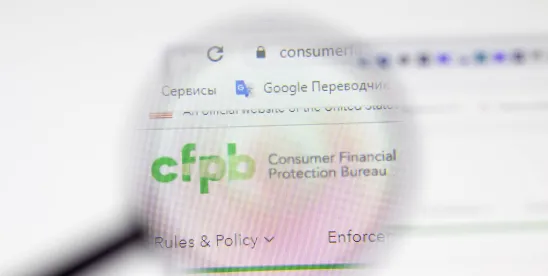On June 4, 2024, the CFPB released a circular cautioning companies against including unlawful or unenforceable terms and conditions in contracts for consumer financial products or services. The circular asserts that companies often embed unlawful or unenforceable terms in the fine print of their contracts, using this “fine print tactic” to deceive consumers into surrendering legal rights or protections.
According to the CFPB, companies that include unlawful or unenforceable terms in contracts for consumer financial products or services may violate the Consumer Financial Protection Act (CFPA)’s prohibition on deceptive acts and practices.
“Federal and state laws ban a host of coercive contract clauses that censor and restrict individual freedoms and rights,” CFPB Director Rohit Chopra said in a separate press release. “The CFPB will take action against companies and individuals that deceptively slip these terms into their fine print.”
The CFPB circular poses the following question: Can persons that include unlawful or unenforceable terms and conditions in contracts for consumer financial products and services violate the prohibition on deceptive acts or practices in the CFPA?
Response, Background & Analysis
The CFPB’s circular asserts that including unlawful or unenforceable terms under federal or state law in contracts for consumer financial products and services may violate the CFPA’s prohibition on deceptive acts or practices.
According to the CFPB, “including an unenforceable material term in a consumer contract is deceptive, because it misleads consumers into believing the contract term is enforceable,” and “disclaimers in a contract such as ‘subject to applicable law’ do not cure the misrepresentation caused by the inclusion of an unenforceable contract term.”
The circular also asserts that a “contractual provision stating that a consumer agrees not to exercise a legal right is likely to affect a consumer’s willingness to attempt to exercise that right in the event of a dispute.”
Many federal and state laws provide that certain terms and conditions in consumer contracts are unlawful or unenforceable. For example, the Consumer Review Fairness Act (CRFA) prohibits the use of form contracts that limit how consumers can communicate their reviews, the Truth-in-Lending Act (TILA) prohibits certain arbitration provisions, and the Electronic Fund Transfer Act, (EFTA), Military Lending Act, and Servicemembers Civil Relief Act (SCRA) each prohibit certain rights-waiving contract provisions. In addition, many state laws prohibit certain contract provisions, including, for instance, one-side attorneys’ fees provisions.
The CFPB’s circular asserts that companies often include provisions in form contracts that are unlawful or unenforceable under these (and other) federal and state laws, while Director Chopra cautioned that “companies may be liable [under the CFPA] even if the unenforceable terms are borrowed from form templates or widely available contracts.”
The circular also stresses that the agency remains attentive to the risk posed by unlawful or unenforceable contract terms, noting that its supervisory examinations have “identified several violations of the CFPA’s prohibition on deception stemming from covered persons’ use of unlawful or unenforceable contract terms and conditions,” and that the agency has challenged fine-print tactics “in several prior enforcement actions.”
Takeaways
As we noted in a January 2023 Alert, the CFPB has already released a proposed rule that would require certain nonbank financial companies subject to its supervisory jurisdiction to submit annual reports about their use of terms and conditions that attempt to waive or limit consumer rights and protections. The proposed rule would establish a publicly available registry of nonbanks that use terms and conditions that, in the CFPB’s view, pose risks to consumers.
The CFPB’s circular demonstrates the agency’s continued focus on the use of so-called fine-print tactics. It signals that the CFPB may inquire about the use of potentially unlawful or unenforceable terms and conditions during its supervisory examinations and that the agency may launch investigations and file enforcement actions to challenge the use of such terms and conditions.
Given the CFPB’s focus, companies subject to the CFPB’s supervisory or enforcement jurisdiction should consider strategies for reducing risks, including by taking steps to confirm that their standard form contracts do not include terms that are unlawful or unenforceable under federal or state law.
Zeba Pirani contributed to this article





 />i
/>i

